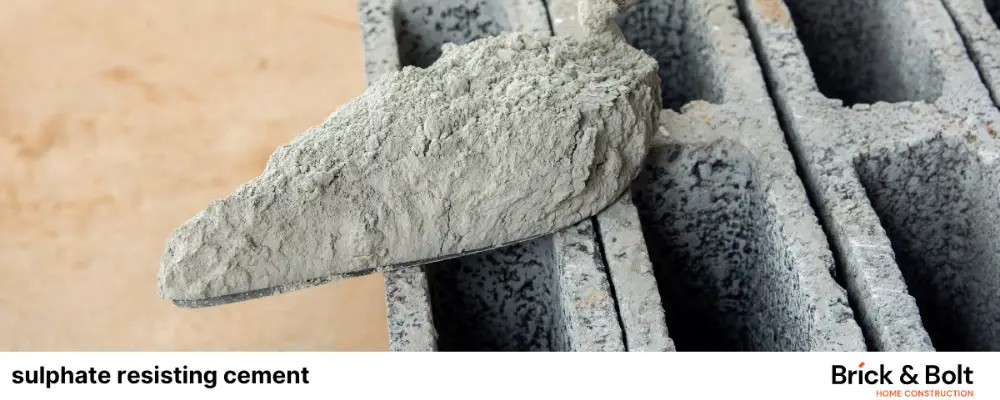Sulphate-resistant cement (SRC) is vital in construction. It protects concrete from sulphates present in soil and water. These elements can weaken concrete over time. So, using the right materials is essential. In this article, we will explore sulphate-resisting cement, its parts, properties, and uses.
What is Sulphate-Resisting Cement?
Sulphate-resistant cement (SRC) lasts longer than regular cement. Regular cement breaks down fast when it meets corrosive sulphates. This causes cracks and damage. SRC contains minimal amounts of tricalcium aluminate (C3A), a compound that reacts with sulphates, considerably improving its strength and durability
Composition of Sulphate Resisting Cement
The ingredients in sulphate-resisting cement are key to its effectiveness. Here are the main components:
- Cement Clinker: It is the main ingredient. It’s made by heating limestone and clay in a kiln. For SRC, less C3A is added to the clinker. This makes it better at resisting sulphates.
- Gypsum: It is added during the grinding process. It manages the pace of cement setting and stiffening.
- Supplementary Cementitious Materials (SCMs): SCMs are extra materials added to cement. They enhance its properties. Examples are fly ash and slag. They make the cement stronger and more durable.
- Other Additives: Sometimes, other materials are added to improve sulphate-resisting cement. They are meant to boost its performance and properties like workability and strength.
Characteristics of Sulphate Resisting Cement
Sulphate-resistant cement has some unique characteristics. They make it different from regular cement.
- Lower Heat of Hydration: SRC produces less heat when it sets. This is important for large structures. Too much heat can cause cracks.
- Increased Durability: As it has less C3A, SRC is more durable. It can resist damage from sulphate attacks, which helps the concrete last longer.
- Longer Setting Time: SRC takes a bit longer to set compared to regular cement. This can be helpful for complex projects.
- Good Workability: Even with its special formulation, SRC is easy to mix and pour. This makes it convenient for builders to use.
- Strength: SRC can withstand heavy loads, making it suitable for strong structures. It often has strength similar to or better than regular cement.
- Hydration Resistance: SRC resists hydration in the presence of sulphates. This keeps the concrete intact over time.
- Chemical Resistance: This cement resists chemical attacks, especially from sulphate ions. This property helps the concrete stay strong and durable.
- Low Shrinkage: Sulphate-resisting cement shrinks less than regular cement as it dries. This means there is a lower risk of cracking in the concrete.
Applications of Sulphate Resisting Cement
Some construction projects use sulphate-resistant cement. It is for areas where sulphate is a concern. Here are some common uses:
- Foundations: SRC is often used to build foundations in areas with high sulphate levels in the soil or water. This helps prevent damage to the foundation over time.
- Sewage Treatment Plants: Sewage treatment plants use SRC. It can handle aggressive chemicals in waste.
- Marine Structures: Structures such as piers and docks are built with SRC. Seawater contains sulphates, so they are exposed to it. This helps keep them strong and safe.
- Concrete Repair Work: When fixing concrete damaged by sulphate, builders often use SRC. It ensures the repairs last.
- Infrastructure Projects: SRC is used in highways, bridges, and other infrastructure at risk of sulphate exposure. This ensures these structures remain durable.
Advantages and Disadvantages of Sulphate Resisting Cement
Sulphate-resistant cement, like any material, has pros and cons. Here are its advantages and disadvantages:
Advantages:
- Enhanced Durability: SRC helps structures resist sulphate damage, which helps to last longer.
- High Strength: This cement offers excellent compressive strength, which can help to handle heavy loads.
- Reduced Maintenance Costs: SRC is less likely to be damaged by sulphates. So, structures made of it require little maintenance.
- Versatility: SRC is a flexible option that can be used in many kinds of construction works.
Disadvantages:
- Higher Cost: Sulphate-resisting cement can be more expensive than regular cement. This can increase the total cost of a project.
- Longer Setting Time: The longer time it takes to set may not be ideal for every project, especially those needing quick completion.
- Limited Availability: SRC may be hard to find in some places. This can make it harder for some builders to use.
Considerations Before Using Sulphate Resisting Cement
Before using sulphate-resisting cement, consider several things:
- Soil Testing: It is important to test the soil to check for sulphate levels. This will help determine if SRC is necessary for the project or not.
- Project Requirements: Consider the specific needs of the construction project, like the environmental conditions and the expected loads on the structure.
- Cost Analysis: Think about the costs associated with using SRC compared to regular cement. Consider the potential long-term benefits of choosing SRC.
- Construction Schedule: Keep in mind that SRC takes longer to set. It must be factored into the construction timeline. This will keep the project on track.
In conclusion, sulphate-resisting cement is key for building in sulphate-rich areas. Its unique characteristics boost concrete’s lifespan. Despite its pros and cons, a careful assessment of needs and conditions helps you to make the right choice. When you use sulphate-resisting cement(SRC) correctly, it will result in strong, long-lasting structures.
FAQs
SRC is commonly used in foundations, sewage treatment plants, marine structures, concrete repairs, and infrastructure projects. These applications are often in areas where sulphate levels are high in the soil or water.
Yes, it is. However, it protects against sulphate damage. This saving on repairs and upkeep makes it worth it.

